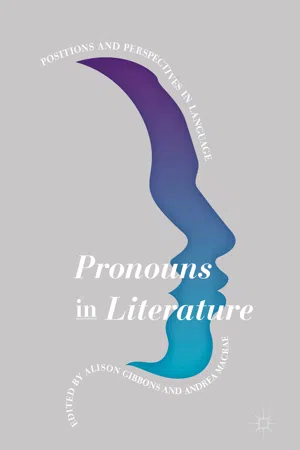1.1 Introduction: Pronouns in Literature
Pronouns in Literature: Positions and Perspectives in Language advances understanding of the role of pronouns in literary contexts. It brings together an international and interdisciplinary group of scholars, including world-leading experts, and offers cutting-edge insights into the functions and effects of pronouns in literary texts. The book engages with a breadth of text-types, including poetry, drama, and prose from different periods and regions, in English and in translation. It progresses recent interest in and accounts of narrative voices and articulations of perspective, by addressing an area which has, historically and canonically, been less well attended to and explored.
This chapter serves both as an introduction to the volume and an up-to-date review of the study of pronouns in literature. Firstly, we briefly discuss the kinds of effects to which pronouns contribute in literary contexts. In doing so, we hope to illustrate their interpretative significance and begin to reveal the complex network of functions pronouns can play a part in. This complexity leads us into the necessarily diverse array of scholarship which has begun to engage with and analyse this functioning over the last 100 years. The next section of the introduction, Sect. 1.2, provides a historical overview of this scholarship, and outlines the latest developments and innovations in research into pronouns across a range of disciplines (including psychology, cognitive studies, stylistics, linguistics, narratology, and literary criticism). Finally, in Sect. 1.3, the chapter introduces the structural logic of the volume, providing a brief summary of each contribution and highlighting the themes arching through the chapters.
Pronouns play a powerful and essential role in several interconnected literary features and their related effects. Perhaps most significantly, pronoun use is a fundamental part of the construction and manipulation of narratorial or poetic voices (or voices of speakers, in drama). In fiction, for example, I, you , we, they, she, he, it, etc. are used delineate a narrator’s subject position in relation to objects/others. In effect, the pronoun simultaneously determines, designates, identifies, refers to and (re-)affirms a particular narratorial role and perceptual locus. Accordingly, it influences readers’ perceptions of the positions of other characters and/or things in relation to that narrator’s role and locus.
Across literary text-types, pronouns are a key part of generating rhetorical structures of positioning, interaction and address within and across the diegetic and extradiegetic levels of narrative (to use Genette’s terminology), or different text-worlds (to use Text World Theory conceptualisations). A narratorial voice often works as a focalising ‘window’—a particular, positioned perspective on fictional worlds. The reader’s processing and perception of the fictional world is mediated, and to some extent manipulated, by the nature of this positioned perspective. Pronouns thereby contribute to readers’ narrative comprehension and dynamic conceptual world-building (Emmott 1997; Gavins 2007) . Partly through the focalising function of a particular pronoun-designated position, the reader may be led to identify with, or in other ways relate to, that position. Pronouns can therefore affect readers’ empathetic, emotional and ideological relations with and responses to narratorial, poetic and other speaking voices and characters in literature.
Many aspects of these literary features and effects have received critical attention across a range of disciplines within literary study. Little of this literary critical and theoretical scholarship, however, has addressed the role of pronouns, specifically, in generating these features and effects. The chapters in this volume are rooted in the interconnected fields of stylistics, cognitive poetics, narratology, rhetoric and theoretical, applied and empirical linguistics. Some also draw on aspects of literary pragmatics and corpus stylistics. As this book demonstrates, and as the next section explains, contemporary stylistic and narratological scholarship offers the most advanced tools for investigating the positions and perspectives created by pronouns, and drawing out and developing new insights into their effects on readerly interpretation and experience.
1.2 The State of the Subject
The theoretical foundations of this book include work on pronouns in linguistic theory and work on the role of pronouns within literary features across a range of literary and cognitive narratological publications. Linguistic theory on the referential and deictic functioning of pronouns began with Jespersen (1924) and Bühler (1934) in the first half of the twentieth century, and was picked up Jakobson in his key 1956 paper (published in 1971). Deictic theory of pronouns was then significantly developed in the latter half of the twentieth century by Benveniste (1971 [1966]) Lyons (1977), Jarvella and Klein (1982), Rauh (1983) and Fludernik (1991), all of whom draw explicitly on those key early works.
Much of this linguistic work is focused on deixis as a whole: attention to pronouns tends to occur only in sections, though often as part of key theoretical arguments explicating deixis more broadly. Jakobson’s category of ‘shifters’ is a case in point, as captured by Fludernik’s (1991) discussion. Fludernik addresses some theoretical entanglements within the concepts of shifters and shifting, tracing the evolution of the concepts from Jespersen and Jakobson, via Burk’s rendering of Peirce’s indexical symb...
